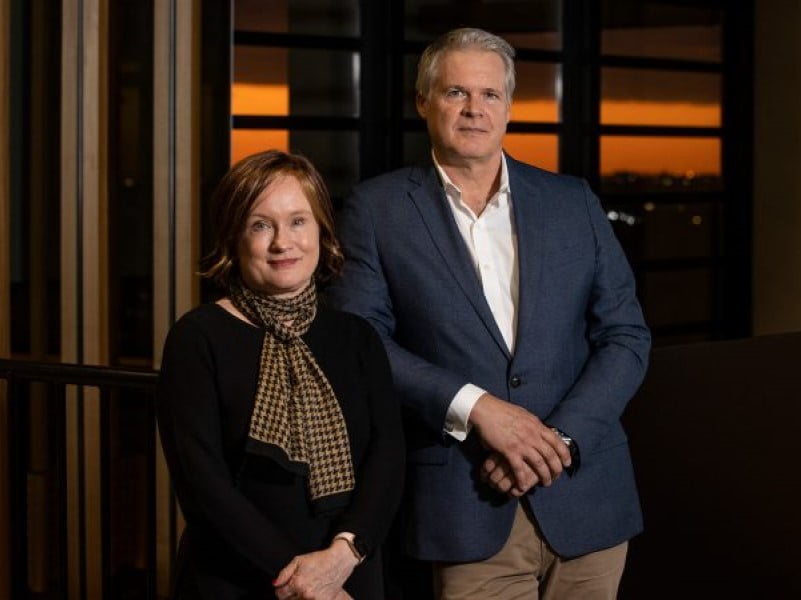Australia has a brand new HealthTech and BioTech venture capital outfit called Tenmile and backed with $250 million in capital from Andrew and Nicola Forrest’s investment group Tattarang.
Based in Western Australia, Tattarang says the Tenmile seed and expansion capital will be ‘evergreen’. The VC will look to support early-stage companies through the so-called ‘valley of death’, the period when no revenue is being generated and the companies are still bringing their products to market.
Currently, Tenmile has two portfolio investments. The first is Perth-based drug development company Emyria, which is currently developing medicinal cannabinoids and psychedelics. The second is Adelaide-based Carina Biotech, a pre-clinical immunotherapy company focusing on chimeric antigen receptor T-cell therapies, a potential new treatment for solid cancers.

Tattarang chair Andrew Forrest said the independent Tenmile would be able to act quickly because it does not have obligations to other investors and lending providers.
“Our laser-focused approach means we can help early-stage companies, researchers and entrepreneurs tap into seed funding to help them when they need it most, and then provide follow-on support, which is often unavailable through government or public sector funds,” said Mr Forrest.
Tattarang co-chair Nicola Forrest said that Tenmile would remain committed to Tattarang’s responsible investment framework, which includes backing female founded and led businesses.
Tenmile has also partnered with San Francisco-based digital health incubator as a partner in its latest digital health fund. Tenmile executive chair Dr Steve Burnell said the firm will focus on opportunities across Australia as well as looking for opportunities to provide access to international markets.
“Although Tenmile is focused on opportunities in Australia and on building the broader health sciences commercialisation ecosystem here, we will continue to invest and partner in international markets both for the returns and to support our Australian investees to access markets and capital internationally,” said Dr Burnell.
Dr Burnell is particularly excited about opportunities in immunology, oncology, digital health, the microbiome and microbial resistance. He is also the director of the Collaborate Against Cancer, Covid-19, and OceanOmics programs at the Forrest’s philanthropic Mindaroo Foundation.
Dr Burnell said that a lot of Australian companies list on the ASX too early. He said that some investors create a pressure for liquidity or a quick exit through initial product offerings “very early when there’s still no clinical plan. And then they get into this difficulty of continuing to raise capital”.
Post-Covid, Dr Burnell said now is a good opportunity to “brain reclaim, essentially, to get some of those Australians back into the country who have experience commercializing medical and biotech products…we’ve got these foundations laid, but we really need to support the creation of sustainable companies and sustainable business models”.
Dr Burnell wants a team of about seven or eight to manage the investments, not just with private equity or venture capital experience, but with specific HealthTech and BioTech experience too. The team’s size is currently half of that target with backgrounds working in digital health, diagnostics, point of care devices, and pharmaceuticals.
Dr Burnell said that Australia has the opportunity to become a MedTech and BioTech superpower over the next decade with the support. He believes the Australia capital environment has historically had insufficient HealthTech expertise to help local firms scale.
“There’s a certain level of expertise needed to give you confidence to invest in companies and navigate them over what everyone calls the valley of death. In health technology, you’re having to understand the technology, intellectual property, clinical and regulatory strategy. Then you’ve got the clinical program, which is probably another five years before there’ll be substantial results, certainly by revenue,” Dr Burnell said.
According to Dr Burnell important value add includes connecting companies to regulatory specialists domestically and overseas or leaders who can define clinical strategies for a startup.
“We see a lot of companies in the seed stage that have awesome technology and upon competitions, around the technologies that don’t yet really have the thinking required to take them over the next three to five years to commercialize it,” Dr Burnell said.
In terms of support from the federal government, Dr Burnell praised the research and development tax rebate. He also suggested extending it to private investment and capital that funds research and development activities.
Do you know more? Contact James Riley via Email.

